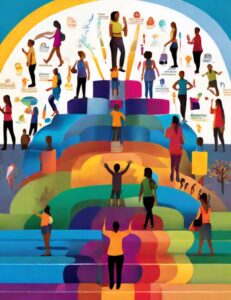 Back in the before times (May 2018), I had a fascinating conversation with Andy Flemming a co-author of the book “An Everyone Culture: Becoming a Deliberately Developmental Organization”
Back in the before times (May 2018), I had a fascinating conversation with Andy Flemming a co-author of the book “An Everyone Culture: Becoming a Deliberately Developmental Organization”
At the time, his insights on creating organizations that nurture continuous learning and growth for everyone felt insightful and powerful. Little did I know how incredibly relevant and urgently needed these principles would become just a few years later as we faced constant disruption and change of the “New Normal.”
Rapidly changing customer behaviors, volatile market dynamics, and the imperative for remote / hybrid work have forced companies to adapt or risk obsolescence.
As organizations grapple with the challenges of the “New Normal,” fostering a culture of continuous learning emerges as a crucial imperative. Delving into strategies for cultivating such a transformative environment, let’s explore how embracing an “Everyone Culture” can pave the way for organizational resilience and growth.
When you have a culture where people are stretching and growing, then you've got a culture that's better able to handle adaptive challenges, the kind that organizations are facing more and more.. Share on XNurturing an “Everyone Culture”
In our chat, Flemming outlined the key principles and practices for allowing organizations to transform into true learning entities, where every individual is both supported and challenged to adapt and evolve. This developmental mindset goes far beyond traditional employee training and appraisal – it’s baked into the culture’s core DNA.
As Flemming explained, “The idea is that you can create organizations where everyone grows, where in the course of being a part of the organization, they can become and are expected to become better and fuller versions of themselves.”
Within the framework of an “Everyone Culture,” the notion of vulnerability-based trust emerges as a cornerstone for fostering genuine growth and adaptation.
Embracing Vulnerability-Based Trust
A critical aspect is the role leadership plays in vulnerability-based trust and embracing a true growth mindset. In deliberately developmental organizations (DDOs), senior leaders openly acknowledge mistakes, publicly stating “Here’s what I think I contributed to the problems…”
This gives permission for others to show up authentically. Flemming shared powerful examples of leaders who start meetings this way, instantly creating a safe environment for self-reflection without blame or hostility. It’s the agile principle of empiricism embodied in leadership.
Redefining Leadership Behaviors
Other crucial leadership practices Flemming highlighted include pushing responsibility down to the lowest levels, confidently expressing that “people are 10x more capable than we think they are.” Leaders act as facilitators, ensuring all voices are heard. They also spend significant time as coaches and developers of people, not just managers.
“The senior execs that I’ve seen operate with high levels of facilitative skills,” Flemming noted. “When they run meetings, they don’t just happen in a haphazard way where the loudest voice or highest on the org chart dominates.”
The Courage to Role Model Growth
Of course, this represents a major leadership mindset shift – one that requires genuine humility, curiosity and courage to model continuous personal growth. Flemming stressed that CEO mandates alone don’t create this culture. It emerges organically as leaders at all levels embrace this developmental stance and make their own learning journeys visible.
As he summarized powerfully: “When leaders themselves operate vulnerably, it has an enormous impact on levels of vulnerability in the rest of the organization.” Creating this climate is a prerequisite for a true self-learning, adaptive culture to take root.
Making Vulnerability the Norm
While not easy, Flemming outlined ways to make this more natural, like establishing “home crews” of peers who support each other’s growth through radically candid feedback. Ultimately, by ritualizing practices that normalize vulnerability as “just how we operate,” it stops feeling so frightening and heroic over time. (Take The Fear and Vulnerability Retrospective for a test drive…)
With vulnerability normalized, we confront the developmental imperative—recognizing that in the ‘New Normal,’ adaptability is not just a competitive advantage but a fundamental necessity for organizational survival.
'Deliberately' is what takes someone's growth from what we would call happy accidents to something that happens much more intentionally, much more purposefully. Share on XThe Developmental Imperative
In the years since our conversation, the pandemic has revealed how mission-critical this capability for agile, continuous adaptation truly is. My key takeaway from revisiting Flemming’s insights? When chaos is the only constant, a developmental culture must be the prime organizational imperative. The alternative is to be perpetually behind the curve, never evolving quite fast enough.
Developing leaders who embrace making their own growth visible and vulnerable isn’t just a “nice-to-have” – it’s the foundation for organizational survival. Flemming’s perspectives feel more vital than ever for thriving amid the never-normal we all now inhabit.
As we reflect on the developmental imperative, it becomes evident that the journey toward organizational resilience is ongoing and multifaceted.
Resources for the Journey Towards Deliberately Developmental Organizations
For those seeking to further explore practices and principles of deliberately developmental organizations (DDOs) for creating more effective and human-centric workplaces, see:
- Unraveling the “Power of Three” in Agile Leadership with Tanner Wortham
- Catalyzing Growth through Coaching
- Six Steps Towards Self-Learning Teams and Organizations
- The Fear and Vulnerability Retrospective
- Trust, Ownership, and Vision: Necessary Conditions for Great Team Performance
- Tackling the Sneaky Beast: Organizational Debt
Listen to our conversation:
Grab a copy of the book:


